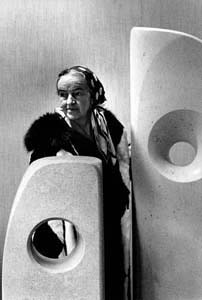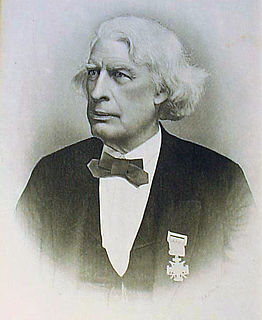A Quote by Honore de Balzac
[Raphael's] great superiority is due to the instinctive sense which, in him, seems to desire to shatter form. Form is, in his figures, what it is in ourselves, an interpreter for the communication of ideas and sensations, an exhaustless source of poetic inspiration. Every figure is a world in itself, a portrait of which the original appeared in a sublime vision, in a flood of light, pointed to by an inward voice, laid bare by a divine finger which showed what the sources of expression had been in the whole past life of the subject.
Quote Topics
Appeared
Bare
Been
Communication
Desire
Divine
Due
Every
Expression
Figure
Figures
Finger
Flood
Form
Great
Had
Him
His
Ideas
Inspiration
Instinctive
Interpreter
Inward
Itself
Laid
Life
Light
Original
Ourselves
Past
Past Life
Poetic
Pointed
Portrait
Raphael
Seems
Sensations
Sense
Shatter
Source
Sources
Subject
Sublime
Superiority
Vision
Voice
Which
Whole
World
Related Quotes
This is a human form in which every Divine entity, every Divine principle, that is to say, all the names and forms ascribed by man to God, are manifest... You are very fortunate that you have the chance to experiences the bliss of the vision of the form, which is the form of all gods, now, in this life itself.
I have gained very great inspiration from the Cornish land- and seascape, the horizontal line of the sea and the quality of light and colour which reminds me of the Mediterranean light and colour which so excites one's sense of form; and first and last there is the human figure which in the country becomes a free and moving part of a greater whole. This relationship between figure and landscape is vitally important to me. I cannot feel it in a city.
So important , indeed, is it (Light), and so much does it pervade with its influence the whole Masonic system, that Freemasonry itself anciently received, among other appellations, that of Lux, or Light, to signify that it is to be regarded as that sublime doctrine of Divine Truth by which the path of him who has attained it is to be illuminated in his pilgrimage of life.
According to the technical language of old writers, a thing and its qualities are described as subject and attributes; and thus a man's faculties and acts are attributes of which he is the subject. The mind is the subject in which ideas inhere. Moreover, the man's faculties and acts are employed upon external objects; and from objects all his sensations arise. Hence the part of a man's knowledge which belongs to his own mind, is subjective: that which flows in upon him from the world external to him, is objective.
Due to his own original special nature, the Jew cannot possess a religious institution, if for no other reason because he lacks idealism in any form, and hence belief in a hereafter is absolutely foreign to him. And a religion in the Aryan sense cannot be imagined which lacks the conviction of survival after death in some form. Indeed, the Talmud is not a book to prepare a man for the hereafter, but only for a practical and profitable life in this world.
It is a mistake to talk about the artist looking for his subject. In fact, the subject grows within him like a fruit and begins to demand expression. It is like childbirth. The poet has nothing to be proud of. He is not master of the situation, but a servant. Creative work is his only possible form of existence, and his every work is like a deed he has no power to annul. For him to be aware that the sequence of such deeds is due and ripe, that it lies in the very nature of things, he has to have faith in the idea; for only faith interlocks the system of images for which read system of life.
In every remodelling of the present, the existing condition of things must be supplanted by a new one. Now every variety of circumstances in which men find themselves, every object which surrounds them, communicates a definite form and impress to their internal nature. This form is not such that it can change and adapt itself to any other a man may choose to receive; and the end is foiled, while the power is destroyed, when we attempt to impose upon that which is already stamped in the soul a form which disagrees with it.
There had been observed in this country certain streams of influence which are causing a marked deterioration in our literature, amusements, and social conduct...a nasty Orientalism which had insidiously affected every channel of expression...The fact that these influences are all traceable to one racial source [Judaism] is something to be reckoned with...Our opposition is only in ideas, false ideas, which are sapping the moral stamina of the people.
Through death you find yourself, because you no longer identify with form. You realize you are not the form with which you had identified neither the physical nor the psychological form of "me". That form goes. It dissolves and who you are beyond form emerges through the opening where that form was. One could almost say that every form of life obscures God.
And when it is suggested that the inward feelings of power or inward monitions or losses of judgement are the germs out of which the divine machinery developed, I return that truth is just the reverse, that the presence of voices which had to be obeyed were the absolute prerequisite to the conscious stage of mind in which it is the self that is responsible and can debate within itself, can order and direct, and that the creation of such a self is the product of culture. In a sense, we have become our own gods.
There were times when it appeared to Dorian Gray that the whole of history was merely the record of his own life, not as he had lived it in act and circumstand, but as his imagination had created it for him, as it had been in his brain and in his passions. He felt that he had known them all, those strange terrible figures that had passed across the stage of the world and made sin so marvellous, and evil so full of subtlety. It seemed to him that in some mysterious way their lives had been his own.
Mathematics is a form of poetry which transcends poetry in that it proclaims a truth; a form of reasoning which transcends reasoning in that it wants to bring about the truth it proclaims; a form of action, of ritual behavior, which does not find fulfilment in the act but must proclaim and elaborate a poetic form of truth.
The books of the great scientists are gathering dust on the shelves of learned libraries. And rightly so. The scientist addresses an infinitesimal audience of fellow composers. His message is not devoid of universality but its universality is disembodied and anonymous. While the artist's communication is linked forever with its original form, that of the scientist is modified, amplified, fused with the ideas and results of others and melts into the stream of knowledge and ideas which forms our culture. The scientist has in common with the artist only this: that he can find no better retreat from the world than his work and also no stronger link with the world than his work.







































